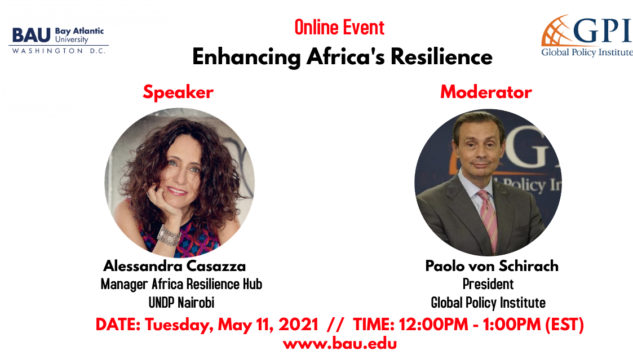Events

Enhancing Africa’s Resilience
Technology and a Young Population Will Make Africa More Resilient
On May 11 the Global Policy Institute and Bay Atlantic University held a webinar titled:
Enhancing Africa’s Resilience
Africa is facing major challenges. Regarding the global Covid pandemic, according to a recent analysis by the IMF (April 2021): “While there are signs of a recovery in advanced economies, sub-Saharan Africa is still in the throes of an unprecedented health and economic crisis. The second wave of COVID-19 infections was worse than the first and countries are bracing for more, while access to vaccines is scant at best. Most African countries will be struggling to vaccinate essential frontline workers this year, let alone the broader population.” Beyond Covid, climate change is affecting Africa. More erratic rainfall caused and will cause severe droughts, and therefore major economic damage to millions of small farmers. All this makes the task of strengthening resilience in Africa even more challenging. However, despite these problems, Africa’s resilience should not be underestimated.
Casazza, pointed out that Africa is much stronger and more resilient than what most people believe. For instance, when it comes to Covid, parts of the Congo DRC had the resources and the manpower to deal with it because health care systems were strengthened at the time of the Ebola crisis. Therefore, in parts of Congo materials and systems were in place that allowed health care workers and others to handle the pandemic better than what has been done in some developed countries. More broadly, added Casazza, Africa’s resilience will be strengthened by the broader utilization of state of the art technologies that have been introduced and adopted by many African states in the last decade or so. In fact, some innovative, user friendly technologies, such as M-Pesa, a widely used payment system managed by mobile phones, have been developed in Africa by African companies. M-Pesa was launched in 2007 by Safaricom, the largest mobile phone operator in Kenya. It is now used by millions of consumers in Kenya and elsewhere in East Africa. More broadly, IT-enabled technologies simplifying the handling of financial transactions or the delivery of public services, combined with a young, better educated and more internationally minded African population and significant new foreign investment in energy, agriculture and critical infrastructure will make the African Continent more resilient.
Alessandra Casazza, Manager Africa Resilience Hub, UNDP Nairobi
Alessandra Casazza became the Manager of the UNDP Africa Resilience Hub in Nairobi in April 2020. She has over 20 years of experience working with UNDP at country, regional and global level and with the private sector, both in New Zealand and in her home country (Italy).
Alessandra served at the UNDP Regional Service Center for Africa in Addis Ababa as Team Leader (OiC) of the Inclusive Growth team since May 2019, and as Regional Programme Advisor on Inclusive Growth and the Sustainable Development Goals (SDGs), since December 2014. Prior to moving to the Africa region, Alessandra served as Policy Advisor for the Millennium Development Goals (MDGs) and Inclusive Growth at the UNDP Asia-Pacific Regional Center in Bangkok (2012–2014), and as Policy Specialist on Capacity Development at the UNDP Bureau for Development Policy (BDP), in New York (2008- 2012).
Alessandra also served at the country level. In August 2006, she joined UNDP Sri Lanka as Programme Manager and worked very closely with the Ministry of Finance on development planning on implementing the MDGs agenda. She joined UNDP Timor-Leste in 2000 as Programme Officer (JPO), to work on poverty reduction and community development. In Timor-Leste Alessandra worked on a large program on the demobilization and reintegration of ex-combatants, the return of refugees from West-Timor, infrastructure rehabilitation and rural development.
Prior to joining UNDP, Alessandra worked for KPMG Italy as Auditor and Advisor on Corporate Social Responsibility and Business Ethics, where she focused on mainstreaming sustainability into business practices in the extractive industry sector. She began her professional career in New Zealand, working as Auditor at Audit New Zealand, auditing public sector entities on behalf of New Zealand’s Auditor-General.
Alessandra has an MSc in development economics from the School of Oriental and African Studies (SOAS) in London, UK, and a Laurea Magistrale (MSc) in economics and business administration from the University of Perugia, Italy.